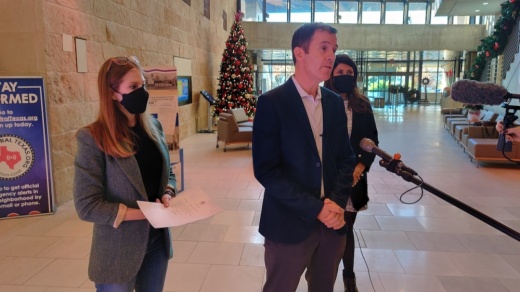Representatives of the voter engagement nonprofit Ground Game Texas announced a petition campaign covering both measures, packaged together as the Austin Freedom Act of 2021. The campaign was successful with nearly 35,000 signatures collected in support. Austin’s requirements for citizen-backed initiative petitions to earn a place on the ballot stands at 20,000 signatures.
If passed, the act would codify existing Austin Police Department marijuana enforcement practices and cement a ban on executing warrants without notice.
Ground Game leaders and local officials gathered at City Hall on Dec. 1 to submit the group’s thousands of signatures for verification by the city clerk. If the petition is certified, City Council can either adopt the proposals or put the policy to a vote; the Freedom Act item would likely appear on the city's May 7, 2022 election ballot if council takes that route. District 2 Council Member Vanessa Fuentes, who joined Ground Game leaders for the December announcement, said council will likely have a discussion about potentially passing the item outright as well.
Mike Siegel, Ground Game’s political director, said the Freedom Act concept came together this year as an attempt to reform “racist” local criminal justice practices and create priorities for local law enforcement.
"Thanks to the tireless efforts of on-the-ground organizers from Ground Game Texas and partner organizations, Austin residents will soon have the ability to make lasting change to our antiquated and racist criminal justice laws," Siegel said in a statement.
Fuentes also said she has backed the petition drive in hopes of ending "discriminatory" police actions.
"We know that we have a history of enforcement practices that are biased, that disproportionately target our Black and brown communities, and that has a serious consequence, especially on young Austinites," she said Dec. 1.
Ground Game also pointed to recent statewide polls showing that a majority of Texas voters—especially those under age 40—regardless of political lean, support reforms to marijuana and no-knock warrant laws.
Where Austin stands
Siegel said the Ground Game initiative is aimed at solidifying the Austin Police Department's "informal" policy for marijuana enforcement, which he said has freed up city resources and kept residents out of jail.
Austin police currently do not issue citations or make arrests for misdemeanor marijuana possession, unless the case ties into “high priority” narcotics or violent felony investigations. That practice was put into place last year after a push by City Council to eliminate arrests for “low-level” marijuana offenses, a move that was initially opposed by former Police Chief Brian Manley.
“We used to issue over 3,000 tickets a year for low-level marijuana possession; we used to make hundreds of arrests a year," Siegel said. "We’ve cut that down by over 99%, so basically in the last year I believe almost no one has gotten a ticket and no one has been arrested for low-level marijuana possession in the city."
No-knock search warrants—those allowing police to enter homes or property without warning—are sanctioned under current APD policy, with some limitations, despite previous council action seeking to ban the tactic. APD may only carry out no-knock warrants if “officer safety is an issue” and with sign-off from both a judge and commanding officer.
Ground Game's proposal would completely scrap the practice, instead mandating that officers executing a warrant announce themselves and wait at least 15 seconds before entering a property. Siegel referenced the 2020 killing of Breonna Taylor at the hands of Louisville police and the 2016 injury of an APD officer in North Austin as examples of how "dangerous" no-knock warrants can be, and said a similar ban in Killeen has proven to be successful.
"We want to ... protect public safety by taking those off the table in terms of police tactics," he said.
The execution of no-knock warrants was also the subject of statewide scrutiny earlier this year through several pieces of proposed legislation. While one, House Bill 492, made it through initial House and Senate processes, it did not become law.
An APD spokesperson said the department is checking into how either policy change could affect its operations.





